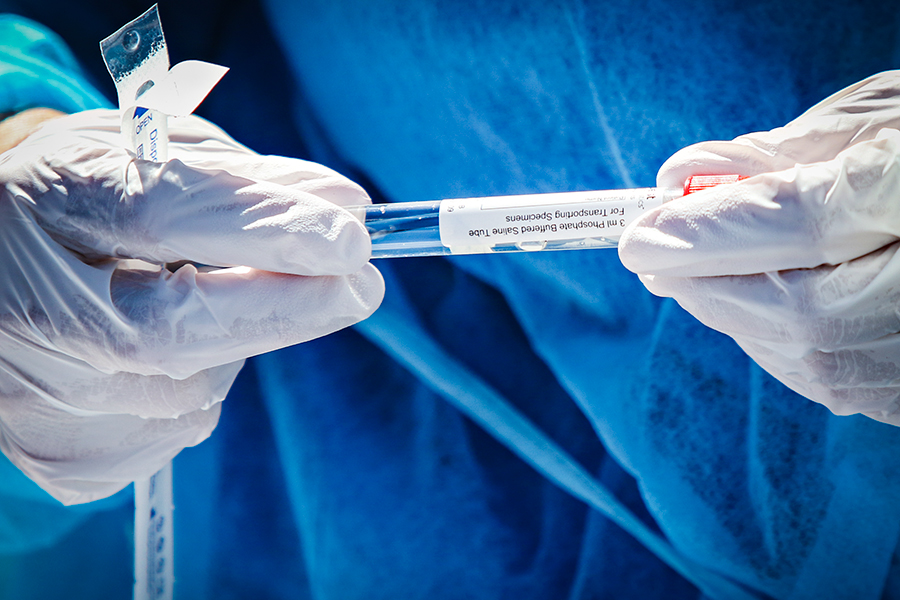Health Department Continues to Face Test Shortage Amid Rising Cases, Hospitalizations
More at-home rapid tests could arrive the week of Jan. 24
By Mike Kordenbrock
By the morning of Jan. 17 the Flathead City-County Health Department had yet to receive any new at-home COVID-19 tests from the Montana Department of Public Health and Human Services, continuing a testing supply drought for the health department that stretches back to when it ran out of tests on Jan. 7.
The testing supply shortage comes amid increasing case counts and hospitalizations in Flathead County as the omicron variant of COVID-19 continues to spread.
The county began the month with about 260 active COVID-19 cases, and by this week that number had risen to 1,295. Similarly, Logan Health was down to low double-digit COVID-19 hospitalizations at the start of January. At the start of this week the hospital had 36 COVID-19 hospitalizations.
Increased COVID-19 spread leads to increased COVID-19 hospitalizations and deaths, and Health Officer Joe Russell is worried about what the testing supply shortage could mean for limiting the spread of COVID-19 locally.
“I hate to sound all gloom and doom, but I’d rather have people test and stay home, than to not have a test available and end up going and making four or five other people sick,” Russell said Monday.
The health officer said he’s frustrated by the situation, and that he isn’t sure when the county will get more tests. The last shipment the health department received was 300 tests short of the 1,000 requested. Gov. Greg Gianforte announced last week that the state had secured 650,000 at-home rapid tests that are expected to arrive the week of Jan. 24.
“I’m hoping they’re going to be in earlier than that, but I haven’t been given any guarantees,” Russell said.
Logan Health has seen a significant increase in testing demand in recent weeks, with about 3,000 tests conducted the week of Jan. 2 compared to 2,300 the week prior. About 90% of the 6,800 tests conducted by the hospital so far this month have been PCR tests. Dr. Cory Short, a hospitalist and the executive physician for Logan Health’s acute care services line, said that based on what he’s heard from the hospital’s pathology department there aren’t any concerns about supply shortages for PCR testing.
Short said that typically Logan has seen surges roughly two weeks after an uptick in positive cases. On Jan. 14 Short said that the majority of patients were on what he called simple cannula oxygen, meaning they were being administered oxygen through nasal tubing and were not requiring large amounts of oxygen.
“Which, anecdotally, what we’ve seen this week would go along with what we’re hearing about hospitalizations with omicron with less severe illness,” Short said.
“Unfortunately it’s still high numbers that require hospitalization and staff and resources.”
The doctor added that even if the variant is generally causing less severe illness, people with COVID-19 could still have other chronic health issues exacerbated by their illness, which can also lead to more hospitalizations.
Increased COVID-19 cases in the community are usually reflected by a similar increase in positive staff cases at Logan, according to Short. “It’s just the same pattern across the country. Kind of what we see in our general population carries over to the healthcare community,” he said.
Meanwhile, Logan Health medical professionals are observing decreased efficacy among some of the monocolonal antibody treatments used for patients who contracted earlier variants of COVID-19 like the delta variant.
“There is another type of monoclonal antibody that is showing a favorable response towards omicron, but again, it’s not as readily available as those other ones,” Short said. “That’s the overarching theme. People say ‘Why does this matter anymore?’ Well, the more this thing has the opportunity to mutate, the areas these monoclonal antibodies attach to on the virus is where we’re seeing mutations.”
Short said that some of the newer antiviral treatments in pill form are still not available at Logan Health, but that the hospital is close to acquiring a limited supply.
“It’s going to be one of those things where the demand more than likely will far outstrip the supply,” Short said.
One encouraging thing is that the antiviral remdesivir has continued to show efficacy against the omicron variant, according to Short.
“I know all of us in the medical community nationally are kind of keeping tabs on what do these record numbers of cases mean for hospitalizations and severity of illness,” Short said. “If we start to trend towards more positive cases and fewer hospitalizations clearly that’s encouraging, and maybe would tell us the virus is mutating towards a less severe form, but the mutations are concerning.”